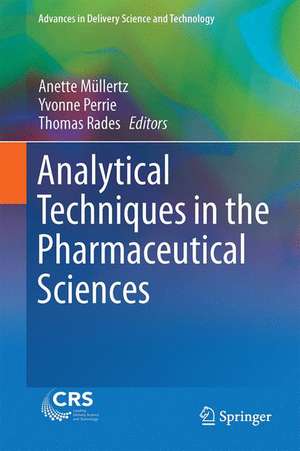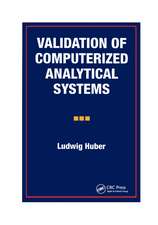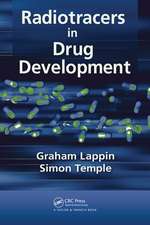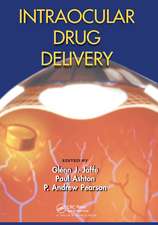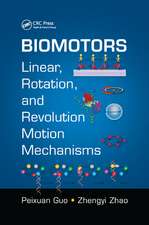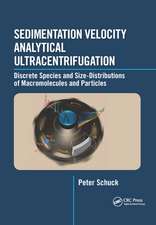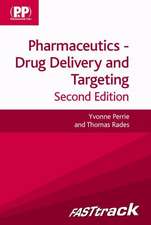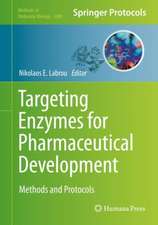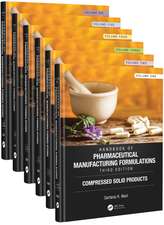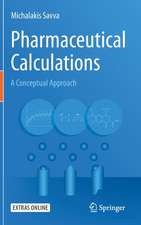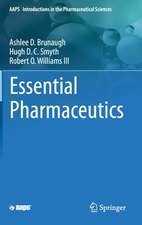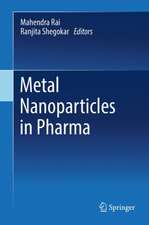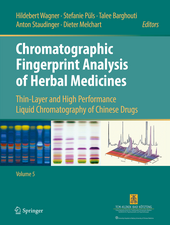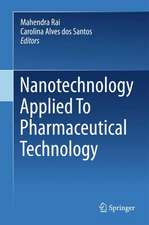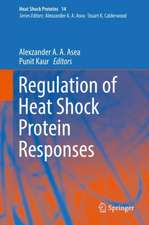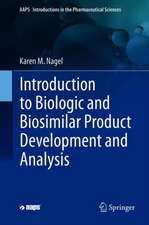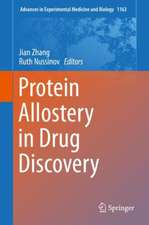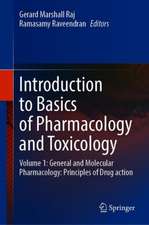Analytical Techniques in the Pharmaceutical Sciences: Advances in Delivery Science and Technology
Editat de Anette Müllertz, Yvonne Perrie, Thomas Radesen Limba Engleză Hardback – 31 aug 2016
The information in this book is designed to support researchers in their ability to fully characterize and analyze a range of delivery systems, using an appropriate selection of analytical techniques. Due to its consideration of regulatory approval, this book will also be suitable for industrial researchers both at early stage up to pre-clinical research.
| Toate formatele și edițiile | Preț | Express |
|---|---|---|
| Paperback (1) | 1678.79 lei 6-8 săpt. | |
| Springer – 9 iun 2018 | 1678.79 lei 6-8 săpt. | |
| Hardback (1) | 1685.27 lei 6-8 săpt. | |
| Springer – 31 aug 2016 | 1685.27 lei 6-8 săpt. |
Preț: 1685.27 lei
Preț vechi: 2055.21 lei
-18% Nou
Puncte Express: 2528
Preț estimativ în valută:
322.47€ • 337.59$ • 266.83£
322.47€ • 337.59$ • 266.83£
Carte tipărită la comandă
Livrare economică 05-19 aprilie
Preluare comenzi: 021 569.72.76
Specificații
ISBN-13: 9781493940271
ISBN-10: 1493940279
Pagini: 879
Ilustrații: XVI, 838 p. 282 illus., 177 illus. in color.
Dimensiuni: 155 x 235 x 44 mm
Greutate: 1.36 kg
Ediția:1st ed. 2016
Editura: Springer
Colecția Springer
Seria Advances in Delivery Science and Technology
Locul publicării:New York, NY, United States
ISBN-10: 1493940279
Pagini: 879
Ilustrații: XVI, 838 p. 282 illus., 177 illus. in color.
Dimensiuni: 155 x 235 x 44 mm
Greutate: 1.36 kg
Ediția:1st ed. 2016
Editura: Springer
Colecția Springer
Seria Advances in Delivery Science and Technology
Locul publicării:New York, NY, United States
Cuprins
UV/Vis spectrophotometry and UV imaging.- Fluorescence spectroscopy: basic foundations and methods.- Mid and Near Infrared Spectroscopy.- Raman Spectroscopy.- Pharmaceutical Terahertz Spectroscopy and Imaging.- Circular Dichroism Spectroscopy for Structural Characterization of Proteins.- Application of Mass Spectrometry in Drug Development Science.- WAXD.- Single Crystal X-Ray Diffraction.- Applications of Small Angle X-Ray Scattering in Pharmaceutical Science.- Thermal Analysis of Pharmaceuticals.- Isothermal Microcalorimetry.- HPLC/UHPLC.- Capillary-based Techniques for Physical-chemical Characterization of Drug Substances and Drug Delivery Systems.- Asymmetrical Flow Field Flow Fractionation: a useful tool for the separation of protein pharmaceuticals and particulate systems.- Light and Electron Microscopy.- Vibrational Spectroscopic Imaging.- Magnetic Resonance Imaging and its Applications to Solid Pharmaceutical Dosage Forms.- Mass Spectrometry Imaging of Pharmaceuticals: From Tablets to Tissues.- Applications of AFM in Pharmaceutical Sciences.- Particle Size Analysis of Micro- and Nanoparticles.- Particle Size Measurements in Aerosols.- Rheology in Pharmaceutical Sciences.- Evaluating Oral Drug Delivery Systems: Dissolution Models.- Evaluating Oral Drug Delivery Systems: Digestion Models.- Application of Cell Culture and Tissue Models for Assessing Drug Transport.
Notă biografică
Anette Müllertz is professor in the Department of Pharmacy, University of Copenhagen, Denmark. She is head of Bioneer:FARMA, funded by the Danish Ministry of Science and Technology to establish research-based scientific services within the area of Drug Development. After receiving her PhD degree in lipid nutrition at the Technical University of Denmark, she worked for Novo Nordisk A/S, on the development of e.g. structured lipids, digestive lipases, and digestion models. Now, at the University of Copenhagen, she is head of the Rational Oral Drug Delivery Research Group, which focuses on developing predictive biopharmaceutical tools for oral drug development and lipid-based formulations. She has contributed to over 130 publications in international peer-reviewed journals and 10 book chapters. She is also a winner of the AAPS Lipid-Based Drug Delivery Award.
Yvonne Perrie is Professor of Drug Delivery within the Strathclyde Institute of Pharmacy and Biomedical Sciences at University of Strathclyde, Scotland. She graduated with First-Class Honours in Pharmacy from Strathclyde University and earned a PhD from the University of London under the supervision of Prof. Gregoriadis. Prof. Perrie’s research is multi-disciplinary and focuses on the development of drug carrier systems for the delivery of drugs and vaccines to enhance patient care globally. Prof. Perrie is a Director-at-large for the Controlled Release Society. She is Editor-in-Chief of both the Journal of Liposome Research and Pharmaceutics; she is also Associate Editor for the Journal of Drug Targeting and the Journal of Pharmacy and Pharmacology.
Thomas Rades is the Research Chair in Pharmaceutical Design and Drug Delivery at the Department of Pharmacy, University of Copenhagen, Denmark. Dr. Rades obtained his PhD from the Technical University of Braunschweig, Germany and has developed an international reputation forhis research on solid drugs and dosage forms as well as in vaccine delivery. Research in both areas aim to improve drug therapy through appropriate formulation and the characterization of medicines; another objective is to increase am understanding of the physico-chemical properties of drugs and medicines. Dr. Rades has published more than 325 papers in international peer reviewed journals. He is an editor of the Journal of Pharmaceutical Sciences, the European Journal of Pharmaceutics, and Biopharmaceutics. Dr. Rades holds an honorary doctorate from Åbo Akademie University (Finland); he is also an Eminent Fellow of the Academy of Pharmaceutical Sciences (UK), a Fellow of the New Zealand Institute of Chemistry, and a member of the College of Fellows of the Controlled Release Society.
Textul de pe ultima copertă
The aim of this book is to present a range of analytical methods that can be used in formulation design and development and focus on how these systems can be applied to understand formulation components and the dosage form these build. To effectively design and exploit drug delivery systems, the underlying characteristic of a dosage form must be understood--from the characteristics of the individual formulation components, to how they act and interact within the formulation, and finally, to how this formulation responds in different biological environments. To achieve this, there is a wide range of analytical techniques that can be adopted to understand and elucidate the mechanics of drug delivery and drug formulation. Such methods include e.g. spectroscopic analysis, diffractometric analysis, thermal investigations, surface analytical techniques, particle size analysis, rheological techniques, methods to characterize drug stability and release, and biological analysis in appropriate cell and animal models. Whilst each of these methods can encompass a full research area in their own right, formulation scientists must be able to effectively apply these methods to the delivery system they are considering.
The information in this book is designed to support researchers in their ability to fully characterize and analyze a range of delivery systems, using an appropriate selection of analytical techniques. Due to its consideration of regulatory approval, this book will also be suitable for industrial researchers both at early stage up to pre-clinical research.
Caracteristici
A ‘must-have’ handbook for inclusion in laboratories working in the field of drug delivery, controlled release, and pharmaceutical sciences Includes protocols that can be adopted by researchers and then adjusted to their needs Describes the most effective practices in using various techniques as well as common mistakes researchers make and how to avoid them ?
